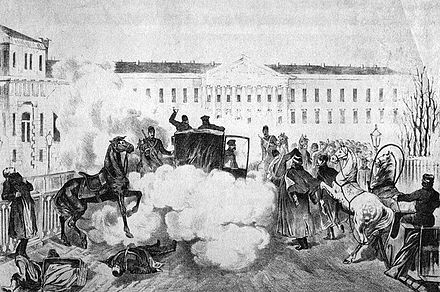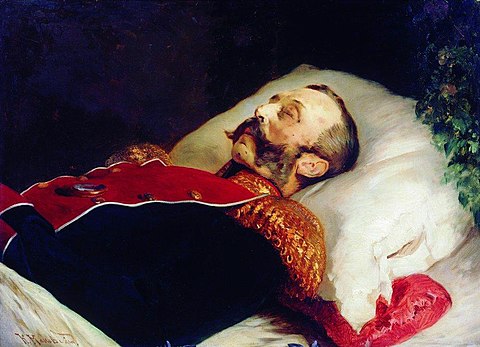March 13, 1881.
Tsar Alexander II was traveling in his carriage after watching the maneuvers of the two Guard battalion. He stopped to visit his cousin, Grand Duchess Catherine, before continuing along his route. Little did he know, his short visit gave a group of assassins the perfect amount of time to get to their assigned places.
At 2:15 PM, the carriage encountered Nikolai Rysakov, who was carrying a bomb. He threw the bomb under the carriage, and it exploded. Alexander Maleichev, the officer that was riding behind the carriage, was killed. Nevertheless, the Tsar’s carriage was bulletproof and therefore was only slightly damaged. Alexander got out of his carriage unharmed and surveyed the damage. Meanwhile, Rysakov was captured almost immediately.

Police Chief Dvorzhitsky offered to drive the Tsar home. As he turned to leave, Ignacy Hryniewiecki approached with a second bomb. He threw it at the Tsar’s feet, where it exploded. This time, the bomb mortally wounded the Tsar and many others.
A third bomber named Ivan Yemelyanov stood ready just in case, but he was not needed. Instead, Yemelyanov and others rushed to the Tsar’s side, where he whispered, “Take me to the palace… there… I will die.”[1]
Alexander was carried to his study in the Winter Palace. There, he passed away around 3:30.
The second bomber died that same day. Before he died, he refused to give up his name or any of his co-conspirators. Nikolai Rysakov, the first bomber, did the opposite. In an attempt to save his life, Rysakov gave up the entire plan.
Andrei Zhelyabov, Sophia Perovskaya, Nikolai Kibalchich, Hesya Helfman, Timofey Mikhailov, and Nikolai Rysakov were all tried by a Special Tribunal of the Ruling Senate. Each and every one of them was found guilty of conspiring to kill the Tsar. They were sentenced to death, and most were hanged on April 15, 1881. Hesya Helfman was not hung with the rest because she was pregnant. Her sentence was deferred and then commuted by Alexander III to forced labor. However, before she served any time, she passed away from postnatal complications in January 1882; her infant daughter did not survive long either.
Ivan Yemelyanov and Vera Figner were the only two conspirators not to be caught with the others. Yemelyanov was tried in 1882 and was sentenced to forced labor. The Tsar pardoned his sentence after he served twenty years of his sentence. On the other hand, Vera Figner remained at large until February 10, 1883. During that time, she arranged the assassination of General Mayor Strelnikov. In 1884, she was sentenced to death, but that sentence was commuted to indefinite penal servitude. After twenty years, her sentence was also pardoned.

[1] L. Hartnett, “The Making of a Revolutionary Icon: Vera Nikolaevna Figner and the People’s Will in the Wake of the Assassination of Tsar Aleksandr II”, (Canadian Slavonic Papers: Vol. 43, No. 2, 2001): 251.

Leave a Reply